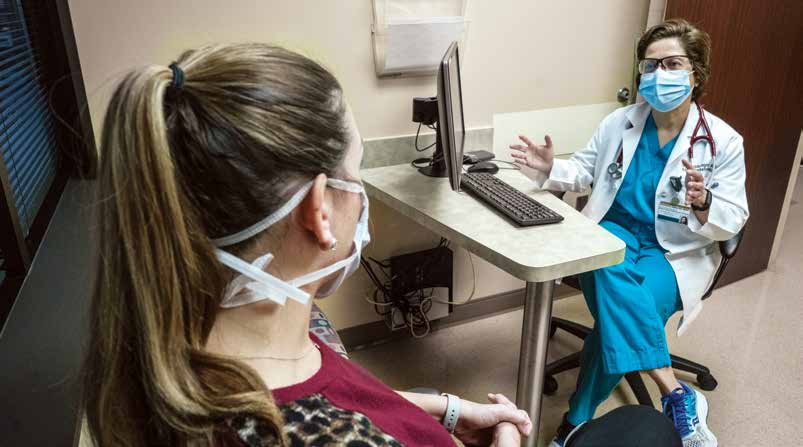By Kevin Jones & Seth Robertson
 Among those helping lead that initiative was Dr. Shubhada Jagasia, MMHC’12, chief of staff for Vanderbilt University Adult Hospital and Clinics. (In May 2021, Dr. Jagasia became president and CEO of Ascension Saint Thomas Hospital’s Midtown and West campuses in Nashville.)
Among those helping lead that initiative was Dr. Shubhada Jagasia, MMHC’12, chief of staff for Vanderbilt University Adult Hospital and Clinics. (In May 2021, Dr. Jagasia became president and CEO of Ascension Saint Thomas Hospital’s Midtown and West campuses in Nashville.)
In a matter of weeks, the U-shaped eighth floor of Medical Center East was transformed into VUAH’s self-contained 37-bed COVID unit, where all admitted patients with the virus would be treated—including “incidental” patients, who’d been admitted for other reasons but tested positive. Not all patients would need intensive care, but any of the rooms could be quickly converted to an ICU room as necessary. Jagasia says the hospital had positive outcomes from several moves made early on, including a COVID mortality rate for hospitalized cases that, as of mid-November, was 10.3 percent compared with 34 percent statewide.
“What we did at Vanderbilt very early in the process—and I think it’s one of our wins—was that we thought about COVID as a service line. Instead of meshing it into the usual business, we called it out as a separate entity,” Jagasia says. “We said, ‘This is likely not going to be a sprint, but a marathon, so let’s set this up well.’” In addition to the dedicated COVID service line, another key move was centralizing decision-making at a COVID command center staffed by providers from across disciplines who are poised to quickly resolve emerging issues. The hospital also standardized clinical treatment guidelines instead of leaving treatment to each provider’s discretion. Daily videoconference “huddles,” in which specialists consult on each patient’s case, further inform and personalize care.
Jagasia often draws on her master of management in health care to help her lead during a pandemic rife with unknowns. “The program helped me grow in tremendous ways,” she says, “and really shaped my career to move along this trajectory.” In particular, the Leading Teams in Organizations course taught her how to be flexible in her leadership and bolster confidence in her team members.
“We have a diverse team, so it has required a different level of leadership, empathy and knowledge of their day-to-day work—as well as a firm understanding of the operational and financial aspects of it all,” she explains. “I would say everything I learned in the classroom has been put into effect.”
Jagasia’s husband, Dr. Madan Jagasia, MSCI’06, MMHC’17, also earned a master of management in health care from Owen and is a fellow physician at VUMC, where he serves as chief medical officer and director of the stem cell transplant program in the Vanderbilt-Ingram Cancer Center. In addition, the couple has two daughters who have attended the university—Ria Jagasia, BS’17, and Puja Jagasia, a member of the Class of 2021.